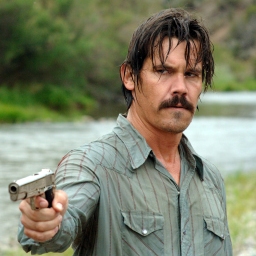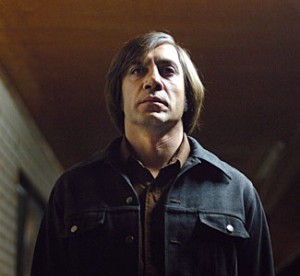 “Seen the arrow on the doorpost, saying, ‘This land is condemned’…” Well, Bob, East Texas may seem rough, but trust me, West Texas is even worse. I’m always going to have a soft spot for Miller’s Crossing, and The Big Lebowski is its own strange and beautiful beast, but the Coen Brothers’ tense, brooding No Country for Old Men, which I caught this morning, is right up among their best work, and that is no small thing. Admittedly, in some ways the Coens don’t seem quite right for a Cormac McCarthy adaptation: They usually thrive on witty, motormouth dialogue, but McCarthy’s men (Woody Harrelson’s character notwithstanding) are invariably strong, silent types. And you can feel the brothers trying to restrain their usual mordant sense of humor through much of the otherwise bleak No Country. (It still leaks out here and there: the mariachi band, “I pre-visioned it,” “these look to be managerial types,” the constant noting of the dead dog, and so on.) Nonetheless, for all intent and purposes, they nailed it. No Country is easily one of the better films out this year, and, if you harbored any doubts about the Coens after their botched remake of The Ladykillers, fret not. The brothers are back in form.
“Seen the arrow on the doorpost, saying, ‘This land is condemned’…” Well, Bob, East Texas may seem rough, but trust me, West Texas is even worse. I’m always going to have a soft spot for Miller’s Crossing, and The Big Lebowski is its own strange and beautiful beast, but the Coen Brothers’ tense, brooding No Country for Old Men, which I caught this morning, is right up among their best work, and that is no small thing. Admittedly, in some ways the Coens don’t seem quite right for a Cormac McCarthy adaptation: They usually thrive on witty, motormouth dialogue, but McCarthy’s men (Woody Harrelson’s character notwithstanding) are invariably strong, silent types. And you can feel the brothers trying to restrain their usual mordant sense of humor through much of the otherwise bleak No Country. (It still leaks out here and there: the mariachi band, “I pre-visioned it,” “these look to be managerial types,” the constant noting of the dead dog, and so on.) Nonetheless, for all intent and purposes, they nailed it. No Country is easily one of the better films out this year, and, if you harbored any doubts about the Coens after their botched remake of The Ladykillers, fret not. The brothers are back in form.
“The crime you see now, it’s hard to even take its measure.” No Country opens on the arid, forbidding landscape of west Texas, as we hear local sheriff Ed Tom Bell (Tommy Lee Jones, doing a lot of soul-searching this autumn between here and Elah), in voiceover, lament what the world has come to. As if to prove his point, we are then introduced to one Anton Chigurh (Javier Bardem, unforgettable), a chilling, wide-eyed psychopath with a lousy haircut, an air-powered cattle gun, and a penchant for making coin tosses with weighty implications. While Chigurh calmly breaks out of police custody (by strangling a deputy to death and murdering an unlucky motorist), a down-on-his-luck local named Llewellyn Moss (Josh Brolin) happens upon the scene of a horrific shootout in the middle of the desert, one which has all the markings of a drug-deal-gone-bad…including $2 million in a black briefcase. Thinking his ship has come in, Moss decides to takes the money and run. But, he’s savvy enough to expect some blowback, and thus sends his wife (Kelley MacDonald, of Trainspotting) off to her mother’s place in Odessa and vacates his old trailer park before hitting the road, traveling from motel to motel across west Texas. But right behind him, ruthless, inexorable, is Chigurh, armed with a transponder that follows the money. And, if Moss can’t stay one step ahead of the madman, or if Sheriff Bell doesn’t find a way to reach him before Chigurh does, there’ll be hell to pay like West Texas hasn’t seen since…well, probably since this morning.
 Having read the novel a few summers ago, I knew what I was getting into here, and thus (as with Chris Nolan’s The Prestige) I was prepared for a third-act jag that’s irritated a few moviegoers out there who expected a more conventional resolution. But, frankly, that’s the book. Near the end of No Country, one of the men we’ve been following tells us about two dreams he’s had recently: While it may seem in the early going that this movie is about the first, it’s actually more about the second. (Put another way, I’m guessing people who saw Lord of the Rings and thought the story was about the ring found all the endings to Return of the King more unnecessary and unsatisfying than those who thought the story was about Frodo and the fellowship.)
Having read the novel a few summers ago, I knew what I was getting into here, and thus (as with Chris Nolan’s The Prestige) I was prepared for a third-act jag that’s irritated a few moviegoers out there who expected a more conventional resolution. But, frankly, that’s the book. Near the end of No Country, one of the men we’ve been following tells us about two dreams he’s had recently: While it may seem in the early going that this movie is about the first, it’s actually more about the second. (Put another way, I’m guessing people who saw Lord of the Rings and thought the story was about the ring found all the endings to Return of the King more unnecessary and unsatisfying than those who thought the story was about Frodo and the fellowship.)
Yes, No Country is a crime yarn a la Fargo and Blood Simple, but it also has bigger game in its sights. One of the scariest aspects of Anton Chigurh is that he seems to believe himself an Agent of something else, something completely and utterly out of his control, and perhaps the scariest notion of all is that he might be right. “If the rule you followed brought you to this,” Chigurh tells one victim, “what was the use of it?” And would following any other rule have made any difference? Sheriff Bell is heartsick over the madness and grotesque violence that seeps out of the corners of society, and another aging lawman tries to lay the blame for “the dismal tide” on “kids with green hair and bones in their noses.” But, as another character reminds us, the West, and the world, has always been like this. You can’t stop what’s coming. At best, all you can do is light a fire in the dark.

Excellent review. Had I not seen the movie, I would be armed with an intelligent,
and well thought out preface to what I was about to see.
You review was simply excellent. Bravo.
– –
Okay,
Father Luke
After sighing my way out of the theater 3/4ths of the way through Ladykillers almost 4 years ago, I’ve been really anticipating ‘No Country’.
It got no love (or, at least, silverware) at its debut in Cannes earlier this year, and that prepared me for the worst. Though, the film does look as if it may be considered too formulaic to really merit any avant guarde awards. After reading this I’m pretty excited.
I read ‘No Country’ a while back, so there wont be any sucker punches. Those Coens, though… with their green hair and bones in their noses.
Man, ‘No Country’ was well done.
The first Coen film I can think of without any form of score or soundtrack. And it was absolutely appropriate.
Hopefully I’ll catch it once more in the coming week.
Hey Alan…glad to hear NCFOM paid off for you. 🙂
Also, I noticed the second time around that there is a Carter Burwell score at certain points, although it’s very, very subdued (For example, in the gas station coin-toss scene.)